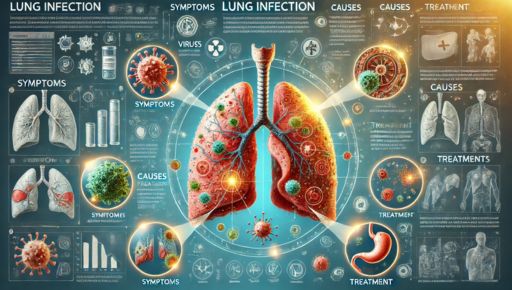Health
Understanding Lungs Infection: Symptoms, Causes, and Treatment Options

Introduction: What is a Lungs Infection?
A lungs infection refers to any infection that affects the lungs, causing inflammation, difficulty breathing, and other associated symptoms. Lungs infections can range from mild to severe and, in some cases, can lead to life-threatening conditions. The lungs, which are vital organs in the respiratory system, are responsible for the exchange of oxygen and carbon dioxide. Any disruption in their function due to infection can have serious health implications. In this article, we will explore the various types of lungs infections, their symptoms, causes, and available treatment options.
Types of Lungs Infections
There are different types of lungs infection that can affect individuals. These infections vary in severity, causes, and treatment approaches. The most common types include:
- Pneumonia: Pneumonia is one of the most prevalent and serious types of lung infections. It occurs when the air sacs in one or both lungs become inflamed and filled with fluid or pus. This infection can be caused by bacteria, viruses, or fungi. Bacterial pneumonia is often treated with antibiotics, while viral pneumonia may require antiviral medications or supportive care.
- Bronchitis: Acute bronchitis is another form of lungs infection that primarily affects the bronchial tubes. These tubes carry air to your lungs. Acute bronchitis is usually caused by viral infections, and while it can lead to coughing, chest discomfort, and fatigue, it typically resolves on its own. Chronic bronchitis, often associated with smoking or prolonged exposure to irritants, can lead to long-term damage to the lungs.
- Tuberculosis (TB): Lungs infection caused by tuberculosis (TB) is a bacterial infection that affects the lungs. TB is highly contagious and spreads through the air when an infected person coughs or sneezes. Early detection and treatment are essential to prevent serious complications and further transmission. TB requires long-term treatment with antibiotics.
- Asthma and Respiratory Infections: While asthma itself is not typically considered an infection, individuals with asthma are more prone to lungs infections like pneumonia or bronchitis. Asthma can increase inflammation in the lungs, making them more vulnerable to bacterial or viral infections. Managing asthma symptoms effectively can reduce the risk of secondary infections.
Symptoms of Lungs Infection
The symptoms of a lungs infection can vary based on the type and severity of the infection. However, some common symptoms include:
- Coughing: A persistent cough that may produce mucus or phlegm is one of the most common symptoms of lung infections.
- Shortness of Breath: Difficulty breathing or feeling winded after minimal physical activity can indicate a serious lung infection.
- Chest Pain: People with lung infections often experience chest discomfort, which may worsen when breathing deeply or coughing.
- Fever and Chills: An infection often triggers the body’s immune response, leading to fever, chills, and sweating.
- Fatigue: Constant tiredness or a general feeling of weakness is common during lung infections.
- Wheezing: Wheezing or a high-pitched whistling sound when breathing is another symptom often associated with bronchitis and asthma-related infections.
- Bluish Lips or Fingernails: In severe cases of lung infection, oxygen levels may drop, resulting in a bluish tint to the lips or nails.
If you experience any of these symptoms, especially shortness of breath or chest pain, it is important to seek medical attention immediately.
Causes of Lungs Infection
The causes of lungs infection can be categorized into various factors, including viruses, bacteria, and fungi. Here are some common causes:
- Viruses: Many lungs infections are caused by viral infections, such as the flu, respiratory syncytial virus (RSV), and coronaviruses. These viruses attack the respiratory system, leading to inflammation and other symptoms. Viral infections are highly contagious and can spread easily from person to person.
- Bacteria: Bacterial infections like pneumonia or bronchitis are caused by harmful bacteria that infect the lungs. Bacteria can enter the lungs through inhalation or from an infection in another part of the body, such as the sinuses. Streptococcus pneumoniae and Haemophilus influenzae are some common bacterial pathogens responsible for lungs infections.
- Fungi: Fungal infections, though less common, can also cause lungs infections. Fungi such as Histoplasma, Coccidioides, and Aspergillus can infect the lungs, especially in individuals with weakened immune systems. These infections are more common in specific regions or environments, such as areas with certain types of soil or during exposure to bird droppings.
- Environmental Factors: Exposure to certain environmental factors, including smoke, air pollution, and chemicals, can also increase the risk of developing lungs infections. People with chronic lung diseases like asthma or COPD (chronic obstructive pulmonary disease) are especially susceptible.
- Weakened Immune System: Individuals with a weakened immune system, such as those with HIV/AIDS or those on immunosuppressive medications, are more prone to developing infections, including lungs infections.
Risk Factors for Lungs Infection
Certain factors can increase the risk of developing a lungs infection. These include:
- Age: The very young and the elderly are more susceptible to lungs infections due to weaker immune systems.
- Smoking: Smoking damages the airways and lungs, making them more vulnerable to infections.
- Pre-existing Health Conditions: Conditions like asthma, diabetes, and heart disease can increase the likelihood of lung infections.
- Poor Hygiene: Poor hand hygiene and exposure to crowded environments can increase the risk of viral and bacterial infections.
- Weak Immune System: Individuals with conditions like HIV/AIDS or those undergoing chemotherapy may have a compromised immune system, making them more susceptible to infections.
Treatment for Lungs Infection
The treatment for lungs infections depends on the underlying cause and severity of the infection. Here are the main treatment options:
- Antibiotics: If a bacterial infection is diagnosed, antibiotics will be prescribed to help combat the infection. It is important to complete the entire course of antibiotics, even if symptoms improve, to ensure the infection is fully eradicated.
- Antiviral Medications: For viral infections like the flu or RSV, antiviral medications may be prescribed to reduce the severity of symptoms. However, in many cases, viral infections are self-limiting and may only require supportive care.
- Supportive Care: For mild cases, treatment may involve supportive care, including rest, fluids, and over-the-counter medications to relieve symptoms like fever and coughing.
- Hospitalization: Severe cases of lungs infection, such as pneumonia or tuberculosis, may require hospitalization. In the hospital, patients may receive oxygen therapy, intravenous antibiotics, and other forms of intensive care.
- Vaccines: Vaccines are available for certain infections that affect the lungs, such as pneumonia and the flu. Vaccination can help prevent infections and reduce the risk of complications.
Prevention of Lungs Infection
Preventing a lungs infection involves a combination of lifestyle habits and preventive measures. Some key tips include:
- Practice Good Hygiene: Wash hands frequently and avoid close contact with sick individuals.
- Quit Smoking: Smoking cessation reduces the risk of lung damage and infections.
- Get Vaccinated: Vaccines for influenza, pneumonia, and other respiratory infections can prevent many lung-related infections.
- Boost Your Immune System: A healthy diet, regular exercise, and adequate sleep help strengthen the immune system.
- Avoid Exposure to Pollutants: Minimize exposure to secondhand smoke, air pollution, and harmful chemicals.
Conclusion
A lungs infection can significantly impact your respiratory health and overall well-being. Recognizing the symptoms early, understanding the causes, and seeking appropriate treatment are essential for effective management. While most lungs infections are treatable, some can lead to complications if left untreated. By following preventive measures and maintaining a healthy lifestyle, you can reduce the risk of developing lung infections and promote better respiratory health. If you suspect you have a lungs infection, consult with a healthcare professional to determine the best course of action for your condition.
Health
Can Stress Trigger Autoimmune Diseases?

Stress has become an almost constant companion. From work pressures and personal challenges to environmental factors, our bodies are constantly adapting to stressors. While occasional stress is a natural part of life, chronic stress can have profound effects on overall health.
One area that has gained attention in medical research is the potential link between stress and autoimmune diseases. Can stress truly trigger these conditions, or does it merely worsen existing problems? Let’s explore.
What Are Autoimmune Diseases?
Autoimmune diseases occur when the immune system, which typically protects the body from infections, mistakenly attacks its own cells and tissues. Normally, the immune system identifies harmful invaders like bacteria and viruses and responds by neutralizing them.
In autoimmune conditions, however, this defense mechanism fails, leading to inflammation, tissue damage, and a wide range of symptoms depending on the organ or tissue involved. Common autoimmune diseases include:
1. Rheumatoid Arthritis: This occurs when the immune system attacks the joints.
2. Lupus (Systemic Lupus Erythematosus): This affects the skin, joints, kidneys, and other organs.
3. Type 1 Diabetes: This is where insulin producing cells in the pancreas are destroyed.
4. Multiple Sclerosis: This involves attacks on the nervous system.
5. Hashimoto’s Thyroiditis: This targets the thyroid gland.
The autoimmune disorder symptoms can vary widely, from fatigue, joint pain, and skin rashes to organ specific problems, making early diagnosis a challenge.
What Are The Major Causes Of Autoimmune Diseases?
The exact cause of autoimmune diseases is not fully understood, but experts believe that a combination of genetic, environmental, and lifestyle factors contributes to their development. Some of the major causes include:
1) Genetic Predisposition: Certain genes can make individuals more susceptible to autoimmune diseases. Family history often plays a role, although it does not guarantee disease development.
2) Environmental Triggers: Infections, exposure to chemicals, certain medications, or dietary factors may trigger an immune response that leads to autoimmunity.
3) Hormonal Influences: Women are disproportionately affected by autoimmune diseases, suggesting that hormones like estrogen may influence immune system behavior.
4) Immune System Dysregulation: An imbalance in immune system signaling can lead to self reactivity. Factors like chronic inflammation and poor regulation of immune cells contribute to this process.
While these are well recognized contributors, lifestyle and psychological factors, particularly stress, are gaining attention for their potential role in triggering or exacerbating autoimmune conditions.
Is Chronic Stress A Trigger For Autoimmune Diseases?
Prolonged stress has a significant impact on the immune system of the body. The stress response activates the Hypothalamic Pituitary Adrenal (HPA) axis, leading to the release of cortisol and other stress hormones.
Short term stress can enhance immunity temporarily. But chronic stress has the opposite effect. It can promote inflammation, suppress immune function, and disrupt the balance of immune cell activity. Several studies suggest a link between chronic stress and autoimmune diseases:
1. Exacerbation Of Existing Conditions
People with conditions like rheumatoid arthritis or lupus often report flare ups during periods of high stress. Stress can worsen inflammation, intensifying symptoms.
2. Potential Trigger In Susceptible Individuals
For individuals genetically predisposed to autoimmune disorders, chronic stress may act as a trigger, causing the immune system to self attack.
3. Psychological Factors
Psychological factors, including stress and trauma, can influence immune system regulation and potentially contribute to the outbreak of autoimmune disorders.
While stress alone may not directly cause autoimmune diseases, it is increasingly recognized as a significant factor in both triggering and worsening these conditions. Therefore, managing stress is not just beneficial for mental health but may also help in reducing the risk or severity of autoimmune issues.
How Can Autoimmune Diseases Be Treated?
Treatment for autoimmune diseases varies depending on the specific condition, its severity, and the organs affected. The primary goals are to reduce immune system overactivity, manage symptoms, and prevent organ damage. Common approaches include:
1. Regular Monitoring And Supportive Care: Autoimmune diseases often require ongoing monitoring by healthcare professionals to adjust treatments. To prevent complications, it is important to get autoimmune disease treatment in Coimbatore and enhance your quality of life.
2. Lifestyle Modifications: Diet, exercise, and stress management play crucial roles in managing autoimmune conditions. Anti inflammatory diets, regular physical activity, and adequate sleep can improve overall health and potentially reduce flare ups.
3. Stress Management Techniques: Mindfulness meditation, yoga, deep breathing exercises, and Cognitive Behavioral Therapy (CBT) are effective in lowering stress, which may indirectly reduce autoimmune activity.
4. Medications: Medicines reduce inflammation and pain, help calm an overactive immune system. These target the immune response to minimize tissue damage.
Conclusions
Autoimmune diseases are complex conditions influenced by a mix of genetics, environmental factors, and lifestyle choices. Therefore, chronic stress trigger autoimmune flares and also exacerbates immune system dysregulation and triggers autoimmune responses in vulnerable individuals.
Recognizing the impact of stress and taking proactive steps to manage it, through mindfulness, therapy, or lifestyle adjustments, can be an essential part of preventing or managing these conditions.
Ultimately, understanding the relation between stress and autoimmunity helps individuals to take control of their health, combining medical treatment with holistic approaches for better outcomes. To reduce autoimmune flare ups, visiting the best rheumatology hospital in Coimbatore can help improve your overall wellbeing and support long term immune health.
Health
Medical Oncology Hospital in India & Expert Medical Oncologists
India has emerged as a global hub for high-quality and affordable cancer treatment, with medical oncology at the forefront. Medical oncology is a vital branch of cancer care, focusing on the diagnosis, treatment, and management of cancer using chemotherapy, immunotherapy, targeted therapy, and hormone therapy. With advancements in technology, the availability of skilled professionals, and world-class infrastructure, the Medical Oncology Hospital in India sector has gained immense recognition from patients across the globe.
Understanding Medical Oncology
Medical oncology is one of the three primary disciplines in cancer treatment, alongside surgical oncology and radiation oncology. A medical oncologist is the physician who coordinates a patient’s cancer care, recommending systemic treatments based on the type, stage, and molecular profile of the tumor.
These specialists work closely with pathologists, radiologists, surgeons, and radiation oncologists to formulate personalized treatment plans. From administering chemotherapy to managing side effects and conducting follow-ups, they play a pivotal role in the patient’s journey.
Top Medical Oncology Hospitals in India
India is home to some of the best medical oncology hospitals that provide comprehensive cancer care. These institutions are equipped with state-of-the-art technologies such as PET-CT, linear accelerators, bone marrow transplant units, and robotic surgical systems. Some of the leading hospitals include:
- Tata Memorial Hospital, Mumbai – A pioneer in cancer research and treatment, offering affordable care and advanced therapies.
- AIIMS, New Delhi – Known for its expert faculty and cutting-edge cancer treatments.
- Apollo Cancer Centre, Chennai & Hyderabad – Offers a multi-disciplinary approach with a dedicated medical oncology department.
- Max Super Specialty Hospitals – Provides precision oncology and access to global clinical trials.
- Fortis Memorial Research Institute, Gurgaon – Equipped with next-gen diagnostic and treatment facilities.
These centers not only attract patients from within the country but also from abroad, owing to their reputation for excellence, affordability, and compassionate care.
Role of a Medical Oncologist in India
A Medical Oncologist in India is trained to understand the biology of cancer and the latest advancements in oncology research. Their primary responsibilities include:
- Diagnosing cancer through biopsies, scans, and blood tests.
- Staging the disease and determining the extent of spread.
- Designing an individualized treatment plan that may include chemotherapy, immunotherapy, or targeted therapy.
- Managing side effects and improving quality of life.
- Monitoring patients during remission and ensuring timely follow-ups.
Indian medical oncologists are often trained in premier institutions and many hold international fellowships, making them globally competitive. Many hospitals also have tumor boards where a group of experts jointly decide on the best course of action for each patient.
Why Choose India for Medical Oncology Treatment?
India offers several advantages for patients seeking cancer treatment:
- Cost-effective care: Cancer treatment in India is significantly more affordable compared to Western countries, without compromising quality.
- Internationally trained specialists: Oncologists in India are highly experienced and many have trained at top global institutions.
- Advanced infrastructure: Indian hospitals are equipped with modern technology for diagnosis, treatment, and research.
- English-speaking medical staff: Ensures seamless communication for international patients.
- Shorter waiting times: Quick access to treatment can be crucial in managing cancer effectively.
Innovation and Research
India is also making strides in clinical research and trials in medical oncology. Hospitals collaborate with global pharmaceutical companies and research institutes to test new drugs, targeted therapies, and precision medicine approaches. This gives patients access to innovative treatments that may not be available elsewhere.
Conclusion
The field of medical oncology in India is witnessing rapid growth, driven by technological innovation, expert physicians, and world-class hospital infrastructure. Whether you’re looking for preventive oncology, early-stage diagnosis, or complex cancer management, India offers reliable and compassionate care tailored to each patient’s unique needs. Choosing a reputed Medical Oncology Hospital in India and consulting a skilled Medical Oncologist in India can make a significant difference in the outcome and quality of life of a cancer patient.
Health
Top Nephrology Hospital in Hyderabad: Expert Kidney Care You Can Trust
When it comes to kidney health, choosing the right hospital is critical. Hyderabad, known for its advanced medical infrastructure, is home to several reputed nephrology hospitals that offer world-class care to patients suffering from kidney diseases. Whether you’re looking for dialysis, kidney transplant services, or treatment for chronic kidney conditions, Hyderabad has established itself as a hub for comprehensive nephrology services.
Understanding Nephrology and Its Importance
Nephrology is the branch of medicine focused on the diagnosis and treatment of kidney-related disorders. The kidneys play a vital role in filtering waste from the body, maintaining fluid and electrolyte balance, and regulating blood pressure. Any malfunction can lead to serious health complications, including chronic kidney disease (CKD), kidney failure, and even cardiovascular problems.
Early diagnosis and timely medical intervention can help manage most kidney disorders effectively. That’s why it’s essential to consult specialists at aNephrology Hospital in hyderabad with the latest technology, experienced professionals, and a proven track record.
Why Hyderabad for Nephrology Treatment?
Hyderabad offers a unique combination of affordability and high-quality medical care. Many nephrology hospitals in the city are equipped with state-of-the-art equipment, highly trained nephrologists, and round-the-clock dialysis support. These hospitals cater not only to patients from India but also from abroad, thanks to their international patient support services.
Hyderabad’s nephrology centers are also known for their multidisciplinary approach, often combining the efforts of nephrologists, urologists, transplant surgeons, dietitians, and counselors to provide holistic kidney care.
Facilities Offered by the Best Nephrology Hospitals
When identifying the best nephrology hospital in hyderabad, it’s important to look for certain facilities and services:
- 24/7 Dialysis Units: Many top hospitals offer multiple dialysis stations with skilled technicians and infection control measures.
- Kidney Transplant Programs: A robust kidney transplant program with high success rates is a hallmark of a reputed nephrology hospital.
- Pediatric Nephrology: Specialized care for children suffering from congenital or acquired kidney diseases.
- Advanced Imaging & Lab Support: On-site diagnostic imaging and pathology labs for quick diagnosis and treatment planning.
- ICU and Emergency Services: For patients with acute kidney injuries or life-threatening complications.
- Patient Education & Counseling: Programs to educate patients and caregivers about disease management and lifestyle changes.
Key Hospitals to Consider
While there are many hospitals offering nephrology services in Hyderabad, a few consistently rank at the top:
- Apollo Hospitals, Jubilee Hills: Known for its experienced nephrology team and successful kidney transplant program.
- Yashoda Hospitals: Offers comprehensive care with state-of-the-art dialysis and transplant units.
- Continental Hospitals: Equipped with cutting-edge technology and a dedicated nephrology wing.
- AIG Hospitals: Recognized for its research-backed approach and world-class medical facilities.
- KIMS Hospitals: Offers a full range of nephrology services from diagnostics to post-transplant care.
Cost of Treatment
Nephrology treatment in Hyderabad is relatively affordable when compared to other metro cities in India or abroad. Dialysis sessions, transplant surgeries, and other procedures are competitively priced without compromising on quality.
Additionally, most hospitals offer cashless services through major insurance providers and government health schemes, making treatment accessible to a broader population.
Conclusion
Whether you’re dealing with a chronic kidney condition or need a kidney transplant, Hyderabad provides access to some of the most trusted and technologically advanced nephrology hospitals in the country. By choosing a facility that specializes in comprehensive kidney care, patients can significantly improve their quality of life and long-term health outcomes.
If you’re searching for the best nephrology hospital in Hyderabad, rest assured that the city has a range of reputable options that combine clinical expertise, compassionate care, and cutting-edge technology.


